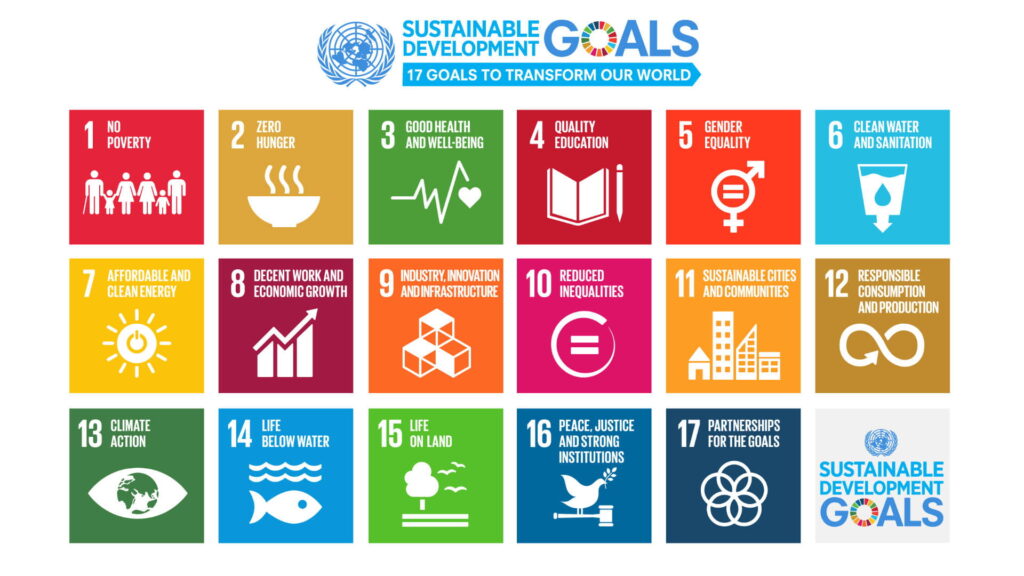
The United Nations 17 Sustainable Development Goals (SDGs) from 2015 provide a framework for addressing pressing global challenges like climate change, inequality, and economic disparity. They have become synonymous with sustainable business practices and nearly all green initiatives refer to them as the foundation.
This article explores each of the 17 UN SDGs, why they matter, and how organizations like yours can implement them practically.
What Are the UN’s 17 Sustainable Development Goals?
Adopted in 2015 as part of the 2030 Agenda for Sustainable Development, the SDGs are a call to action for governments, businesses, and individuals to work collectively toward a sustainable future. They encompass a wide range of economic, social, and environmental objectives.
Each of the 17 goals emphasizes a specific area, from promoting gender equality to combating climate change. While some goals, like affordable clean energy or sustainable production, may directly align with specific industries, others, such as reducing inequalities, resonate across all sectors.

For countries and governing bodies, the 17 SDG are guiding principles for policy making and focus fields for laws and regulations.
For businesses, they offer an opportunity to align with global priorities while driving innovation and long-term resilience. Companies that integrate these goals into their operations not only contribute to a better future but also position themselves as leaders in sustainability.
Many of our customers commit to one or several of them to take action for the planet. Let’s look at each of them more closely.
The UN’s 17 Sustainable Development Goals
These are the 17 UN Sustainable Development Goals and how businesses of all sizes can adhere to them:
1 No Poverty
End poverty in all forms everywhere. Businesses can contribute by providing fair wages, creating job opportunities in underserved communities, and supporting economic inclusion. Addressing poverty also means supporting local economies and investing in community development programs.
2 Zero Hunger
End hunger and promote sustainable agriculture. Companies can adopt sustainable sourcing practices and minimize food waste in their supply chains. Another great measure is supporting farmers through fair trade and innovative agricultural technologies.
3 Good Health and Well-Being
Ensure healthy lives and promote well-being. Businesses can lead by implementing employee wellness programs, ensuring product safety, and engaging in community health initiatives. Promoting a culture of safety and care within organizations is equally critical.

4 Quality Education
Ensure inclusive and equitable quality education. Organizations can invest in training programs for employees, collaborate with educational institutions, and fund scholarships to enhance access to learning. Empowering people through education builds a stronger, more innovative workforce.
5 Gender Equality
Achieve gender equality and empower all women and girls. Businesses can ensure equal opportunities by promoting diversity in leadership, implementing anti-discrimination policies, and addressing workplace inequalities.
6 Clean Water and Sanitation
Ensure access to clean water and sanitation. Companies can reduce their water usage, invest in water-efficient technologies, and support initiatives that improve water access in communities where they operate.
7 Affordable and Clean Energy
Ensure access to affordable, reliable, and sustainable energy. Businesses can lead the way by transitioning to renewable energy sources, improving energy efficiency in their operations, and supporting innovative clean energy solutions.
8 Decent Work and Economic Growth
Promote sustained economic growth and decent work for all. Companies can drive this goal by creating ethical supply chains, fostering innovation, and ensuring fair and safe working conditions for all employees.
9 Industry, Innovation, and Infrastructure
Build resilient infrastructure and foster sustainable industrialization. Businesses can support this goal by adopting green technologies, investing in smart infrastructure, and championing innovation to create sustainable solutions.
10 Reduced Inequalities
Reduce inequality within and among countries. Organizations can prioritize diversity, ensure fair pay, and promote accessibility in their products and services to address inequalities within and beyond their operations.
11 Sustainable Cities and Communities
Make cities inclusive, safe, and sustainable. While this is mainly a task for governmental organizations, companies can contribute by adopting smart building technologies, supporting sustainable transportation systems, and participating in urban sustainability projects.
12 Responsible Consumption and Production
Ensure sustainable consumption and production patterns. Businesses can focus on reducing waste, embracing circular economy principles, and designing products with sustainability in mind.
13 Climate Action
Take urgent action to combat climate change. Companies can take meaningful action by measuring and reducing their carbon footprints, setting science-based targets, and adopting renewable energy and energy-efficient practices.

14 Life Below Water
Conserve oceans and marine resources. Businesses can reduce marine pollution through responsible waste management, sustainable sourcing of seafood, and supporting ocean conservation initiatives.
15 Life on Land
Protect ecosystems and promote biodiversity. Companies can engage in reforestation projects, reduce land degradation, and minimize their environmental footprint through better land use practices.
16 Peace, Justice, and Strong Institutions
Promote peaceful and inclusive societies. Businesses can lead by upholding anti-corruption policies, fostering accountability, and engaging in partnerships that promote stability and inclusivity.
17 Partnerships for the Goals
Strengthen global partnerships. Businesses, governments, and civil society must work together to achieve the SDGs. By engaging in meaningful partnerships, companies can amplify their impact and contribute to collective success.
By aligning their strategies and operations with these goals, businesses can drive sustainable progress while securing their place as leaders in the global shift toward a more equitable and sustainable future.
Why Should Businesses Care About the UN SDGs?
Adopting the UN SDGs isn’t just about doing the right thing—it’s about building resilience, gaining a competitive edge, and addressing growing stakeholder expectations. Investors, customers, and employees increasingly favor businesses committed to sustainability.
We’ve already looked at the goals and what companies can do to fulfill them. While this might appear like a lot of effort and work, there are good reasons to do so!
As with any sustainability related measures in your company, there are many benefits to understanding and adopting the UN Sustainable Development Goals.
First off, it encourages companies to do good for the world – something we think all should do! As we are all part of this planet, everyone needs to help to protect it and make it a better place.

Secondly, governments worldwide are introducing regulations that encourage or mandate sustainable practices, such as the European Union’s Corporate Sustainability Reporting Directive (CSRD). As such, following the SDGs aligns with potential reporting obligations, as well as fulfilling investor expectations on ESG performance.
Last but not least, committing to the UN’s 17 SDGs will lead to long-lasting positive effects on the company such as strengthened employee engagement, competitive advantages and stronger brand image in the eyes of your customers.
Of course, there are many other benefits and we are happy to show you how you can commit to the SDGs and get started with sustainability at your company!
How Reegy Supports Businesses in Achieving the SDGs
At Reegy, we understand that navigating sustainability can be challenging, especially for businesses just starting their ESG journey. That’s why we’ve developed an intuitive platform to help companies measure, manage, and improve their sustainability impact.
- Automated ESG Reporting: Save time and ensure compliance with reporting standards like the CSRD and GRI.
- Carbon Accounting Made Simple: Track and reduce emissions across Scope 1, 2, and 3 activities.
- AI-Powered Action Plans: Receive tailored recommendations to align with specific SDGs.
- Collaborative Features: Engage teams across departments to work toward common sustainability goals.
By integrating the SDGs into your operations, you’re not only improving your business but also contributing to global progress. With the Reegy plattform, you’ll have the tools and insights needed to make a lasting impact!

The Time to Act is Now
The UN SDGs are more than just a set of aspirational goals—they are a roadmap to a sustainable future. Whether you’re an ESG veteran or just beginning your sustainability journey, there’s always room to grow and contribute. Platforms like Reegy are here to support your business every step of the way.
Ready to make a difference? Contact us today to learn how we can help your organization align with the SDGs and take meaningful steps toward sustainability. Together, we can rethink, reinvent, and revolutionize your approach to energy, ESG, and beyond.
Reegy is a complete software solution for ESG & Carbon Footprint Management. Our Reegy Eco Hub enables enterprises, financial institutions and governmental organizations to manage their climate action in one central location along the entire value chain. Track, measure, reduce, and offset your carbon emissions, disclose them to regulators, stakeholders, and customers and lead your company to Net Zero on autopilot!